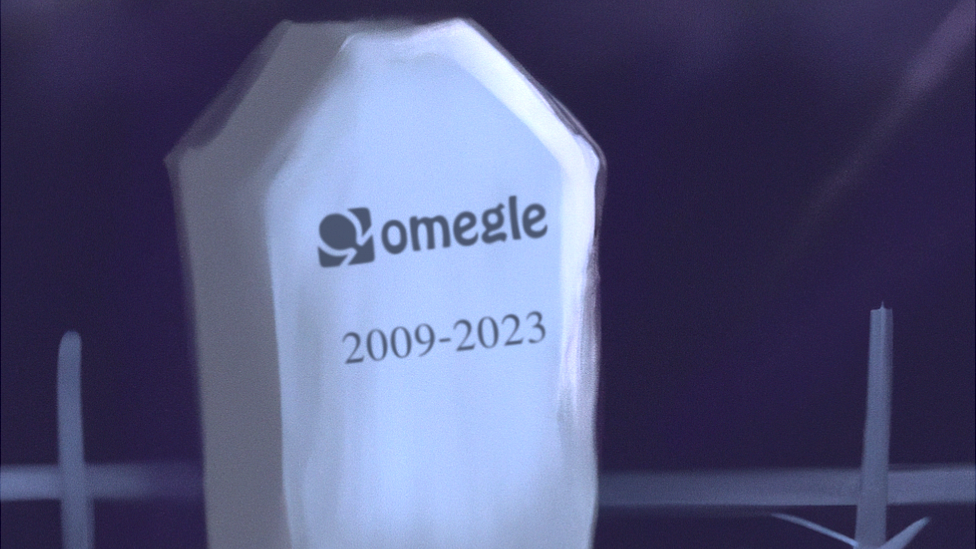Omegle shut down: Video chat website closed after abuse claims
- Published

Omegle's announcement of its closure included an image of its logo on a gravestone
Popular live video chat website Omegle is shutting down after 14 years following user claims of abuse.
The service, which randomly placed users in online chats with strangers, grew in popularity with children and young people during the Covid pandemic.
But the site has been mentioned in more than 50 cases against paedophiles in the last couple of years.
Founder Leif Brooks said, external that operating the website was "no longer sustainable, financially nor psychologically".
"There can be no honest accounting of Omegle without acknowledging that some people misused it, including to commit unspeakably heinous crimes," he said.
"As much as I wish circumstances were different, the stress and expense of this fight - coupled with the existing stress and expense of operating Omegle, and fighting its misuse - are simply too much.
"Frankly, I don't want to have a heart attack in my 30s."
Omegle's closure announcement included an image of its logo on a gravestone.
What is Omegle?
Mr Brooks launched Omegle in 2009 at the age of 18. He described it as "the idea of 'meeting new people' distilled down to almost its platonic ideal", and built on what he saw as "the intrinsic safety benefits of the internet, users were anonymous to each other by default".
The website had around 73 million visitors a month, according to analysts at website watchers Semrush, mostly from India, the US, the UK, Mexico and Australia.
For some teenagers it was seen as a rite of passage to be matched with a stranger in a live video chat where anything could happen.
Indeed, as news of its closure spread, young people who have grown up with Omegle being a wild part of the internet have been sharing stories and memories of the site on social media.
However, Omegle has also been the subject of controversy, and many are also posting horrible stories of the sorts of sexual and predatory behaviour they experienced on the platform.
In a landmark case a young American is suing the website, accusing it of randomly pairing her with a paedophile.
The account user was a minor when the incident took place and the lawsuit against Omegle was filed 10 years later in November 2021.
Omegle's legal team argued in court that the website was not to blame for what happened, and denied that it was a haven for predators.
The case is ongoing.
Omegle's creator Leif Brooks declines to talk to the BBC
Reclusive owner Mr Brooks and his fans argue that the shutdown of Omegle is a symptom of internet freedoms being taken away and the end of an era.
But in many ways Omegle was a strange relic of a former way the internet worked.
The site itself was glitchy and ugly, with an offensive joke about the Chinese president on its landing page.
Moderation was extremely light-touch at a time when politicians and society are asking for more from internet companies.
For instance, this week, in the UK Ofcom issued its first guidance for tech platforms to comply with the Online Safety Act and the communications regulator singled out online grooming.
Two people with knowledge of the inner workings of Omegle say that there wasn't any human moderation despite Mr Brooks' claims.
The entire company was seemingly run solely by him, with no other registered employees.
It was operated from his lakeside house in Florida and when he was asleep or offline, no complaints were acted upon.
Earlier this year, the BBC found that Omegle has been mentioned in dozens of cases against paedophiles in countries including the UK, US and Australia.
Video-sharing platform TikTok banned sharing links to Omegle, after a BBC investigation in 2021 found what appeared to be children exposing themselves to strangers on the website.
Mr Brooks never publicly answered his critics or posted to social media, despite the trend of tech bosses being held to account in parliamentary hearings.
Other sites like it will no doubt rise to fill the void, but the demise of Omegle shows that times have changed since the 18-year-old programmer launched his experimental social platform.
Imagery of young children carrying out sexual acts on camera has risen more than tenfold since the pandemic lockdowns, according to the Internet Watch Foundation (IWF).
In 2022, the IWF logged more than 63,000 webpages showing the material compared to 5,000 before the pandemic.

Cyber reporter Joe Tidy speaks exclusively with child abuse survivor "Alice" and her legal team, as they prepare a case that could have major consequences for social media companies. Then he tracks down Omegle's elusive creator, Leif Brooks.
Watch: Omegle - Matched With My Abuser on the BBC iPlayer (UK only)

Related topics
- Published9 November 2023

- Published15 February 2023

- Published27 January 2023

- Published18 February 2021
